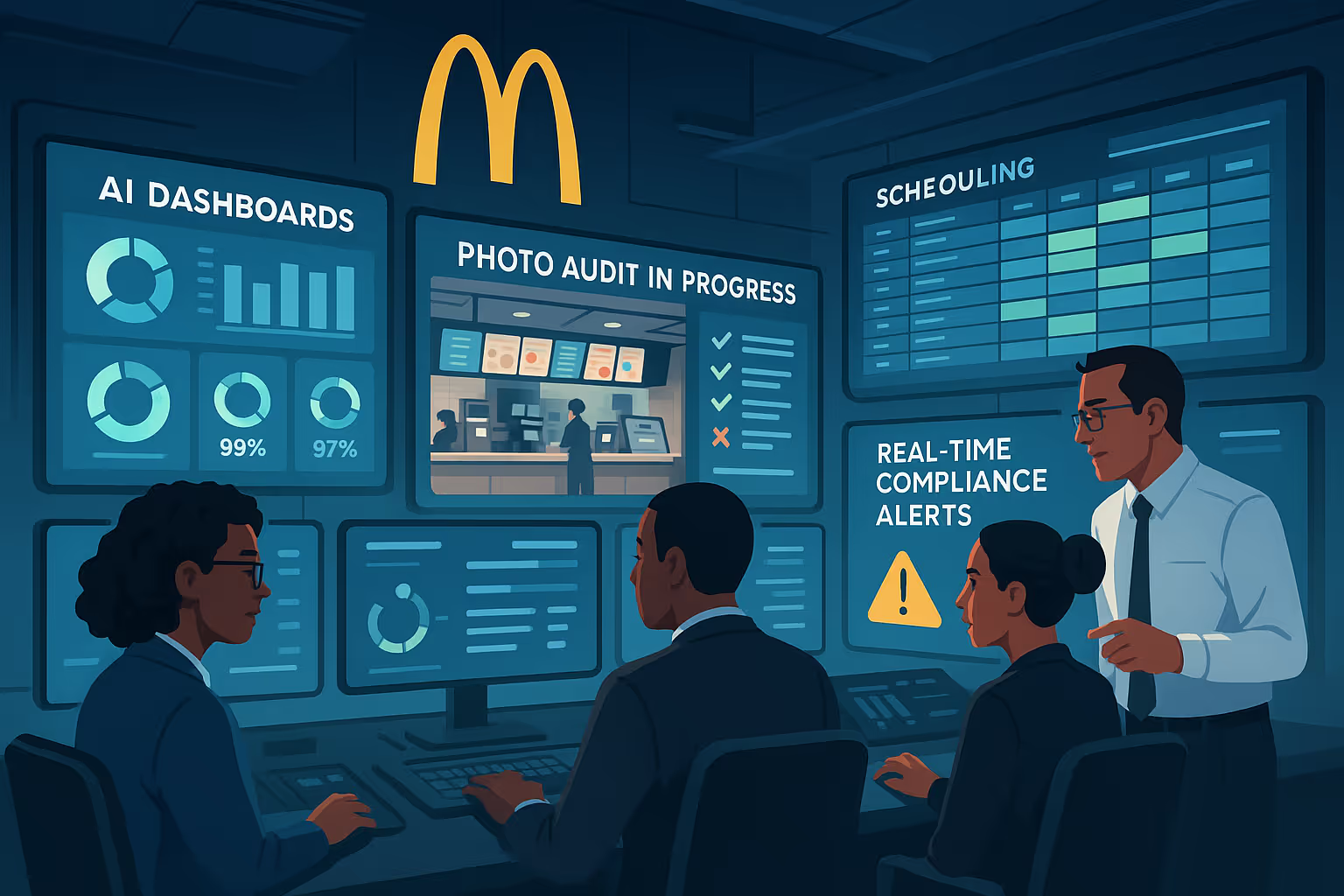Franchise Ops on Autopilot: AI Audits, SOP Compliance, and Performance Dashboards Across 100+ Locations

Why AI Franchise Operations Are Now Essential
AI franchise operations are no longer a futuristic concept—they’re a competitive necessity. Multi-location brands, especially in QSR and retail, constantly battle SOP drift, inconsistent guest experience, and data lags that slow operational rollups. As chains like McDonald’s and Wendy’s pilot AI from computer vision store checks to drive-thru voice assistants, it’s clear: the next generation of operational excellence will be automated, data-driven, and everywhere.
SOP Drift and Franchise Autonomy: The Tension
Systematized operations hinge on standard operating procedure (SOP) compliance. Yet, as brands scale past 100, 500, or even 1,000+ locations—often with diverse franchisees—maintaining gold-standard execution slips. Checklist fatigue, manual data entry errors, and uneven training create real risk in food safety, merchandising, and guest experience. Franchisees want autonomy, but brands demand consistent output. AI automation bridges this gap: not by dictating every step, but by embedding smart guardrails, coaching, and transparency into the daily flow of business.
What the AI Franchise Tech Stack Looks Like
The modern stack is modular and practical, able to plug into existing infrastructure across distributed locations. Here’s how leading multi-unit brands get it done:
1. Computer Vision for Store Audits
- Photo- or video-based AI auditing tools—now piloted by QSR giants like McDonald’s—let managers (or employees) scan merchandising, cleanliness, and signage in real time. AI models flag out-of-compliance areas, freeing field teams to coach vs. chase checklists.
- Loss prevention and health code compliance signals: AI can spot unsafe kitchen setups, missing gloves, or food storage issues far faster than manual checks, supporting both regulatory and brand standards.
2. LLM Copilots for SOPs and Onboarding
- LLM-powered SOP copilots provide step-by-step guidance for managers, adapting to context (e.g. lunch rush vs. closing time), highlighting policy updates, and answering queries 24/7.
- Used as an onboarding and retraining engine, these bots remedy knowledge gaps while fostering compliance.
3. AI Scheduling and Demand Forecasting
- Algorithms process historical POS, footfall, and seasonal trends to predict optimal staffing for each location, reducing both under- and over-staffing.
- Franchisees get dynamic labor budgets that flex with daypart and local events.
4. Performance Dashboards and Anomaly Detection
- Cloud dashboards consolidate multi-location data streams: compliance scores, sales, mystery shop results, labor %, and more.
- AI anomaly detection flags outliers in real time—say, spiking waste or sudden ticket-time increases—allowing field leaders to investigate before small problems balloon.
Case Study: McDonald’s AI Drive-Thru Expansion. By rolling out voice AI across 2,000+ U.S. stores, McDonald’s improved order accuracy, shortened queue times, and freed up staff for guest engagement. AI captured subtle upsell cues and reduced missed LTO offers, producing measurable revenue lift and consistency.
The Franchise AI Rollout Playbook
Implementing AI at scale means more than just plugging in tech. Here’s a proven operator playbook:
1. Stakeholder Engagement & Incentives
- Include franchisees early in the vendor and feature selection process—respecting local knowledge and encouraging buy-in.
- Build in incentive structures (e.g., bonus pools for highest mystery shop scores, or labor efficiency rewards) tied directly to AI dashboard outputs.
2. Change Management & HITL Escalation
- Pilot with a “willing cohort,” ideally managers keen on efficiency and innovation.
- Use human-in-the-loop (HITL) escalation: allow AI to elevate only ambiguous or high-impact exceptions to area coaches, building trust in automation.
- Run parallel manual and AI systems during transition, then sunset only when confidence and ROI targets are met.
3. Data Privacy at the Edge
- Use edge AI and federated learning whenever possible: data is analyzed locally and only anonymized, aggregated signals are pushed to the cloud.
- Scrupulously audit privacy policies to reassure franchisees and comply with tightening global data regulations.
Week-One Wins Checklist
Brands can expect tangible wins within days—even in week one:
- Checklist digitization and auto-scoring: Goodbye, clipboards.
- AI coaching prompts for frontline procedures based on real store snapshots
- Loss prevention and food safety flags—before incidents occur
- SOP answers on demand via LLM copilot powered by enterprise documentation
- Performance dashboards for visibility up and down the org chart
Measuring ROI: The Key KPIs
C-suite and field leaders should obsess over a few core AI franchise operations metrics:
- Mystery shop NPS or compliance scores
- Order accuracy and ticket time (tracked pre/post AI)
- Labor % variance to sales—spot before it spikes
- Number of SOP violations caught (and self-resolved) by AI
- Trend in manual compliance touchpoints required (should decrease markedly)
For real-world context, McDonald’s AI drive-thru pilots have reported reduced average service times by up to 30 seconds per order and increased order accuracy by 5-7%. Industry-wide, the AI-in-QSR market will grow to $12.9B by 2032, showing mounting ROI and urgency for brands to adopt.
Avoiding Pitfalls: Lessons from the Field
- Early missteps? Wendy’s and Domino’s both struggled initially with guest acceptance of AI voice before refining models for regional accents and adjusting escalation protocols.
- Data Protection: Well-publicized breaches at digital-forward QSRs underscore the need for strict privacy controls on guest and ops data—especially for video or voice.
- Franchisee Enablement: Brands who win invest as much in franchisee training and support as in the AI itself. This ensures tech is an enabler, not an enforcer.
Blueprint for Consistent, Scalable, and Profitable Growth
As the industry pivots to AI-first operations, top brands align on:
- Progressively digitized checklists and SOPs
- Always-on, edge-based photo/computer vision audits
- Unified dashboards cascading insights from HQ to field
- Embedded LLM copilots for every manager
- And automated workflows that flag, coach, and incentivize best-in-class execution—all while defending operator autonomy and privacy
The bottom line: AI-driven franchise management isn’t about control—it’s about enablement, performance, and trust at scale.
Ready to blueprint your AI franchise operations for consistent, high-performance results across every location? Connect with JMK Ventures to accelerate your automation journey and unlock modern, data-driven growth.
%20(900%20x%20350%20px)%20(2)%20(1)%201%20(1).svg)

%20(900%20x%20350%20px)%20(4).png)

